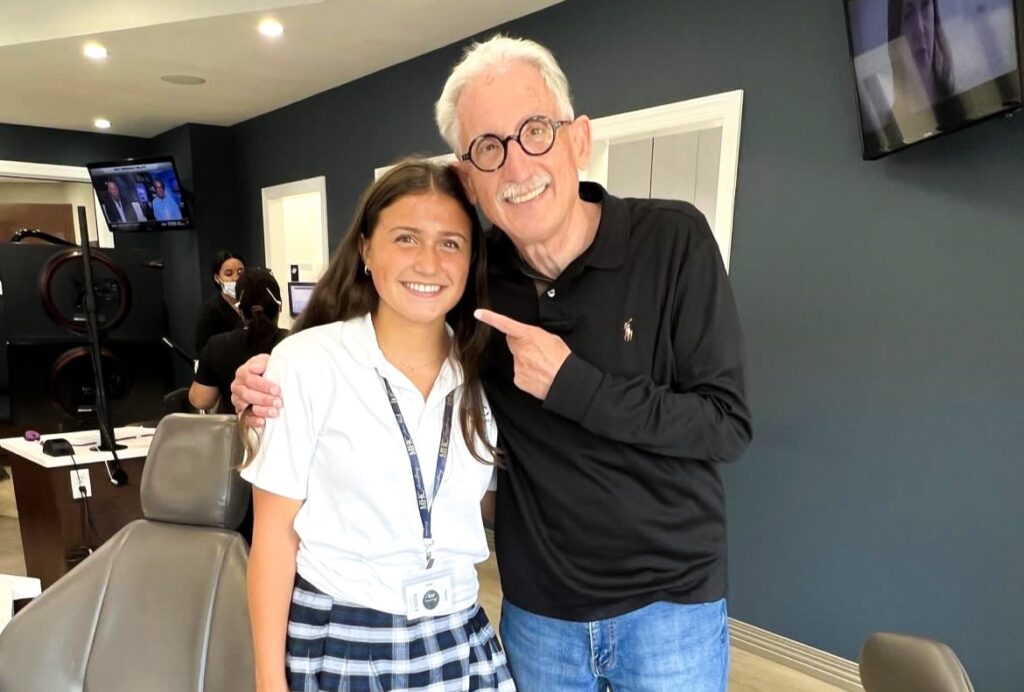Keeping up with and protecting your retainer may seem like common sense—but accidents happen to everyone. Today, Dr. Bruce and Dr. Gabriel of Ollins Orthodontics will give you great information regarding this question: What should I do if I lose or damage my retainers?
What Are Retainers?
Retainers are removable dental appliances used to maintain teeth alignment after orthodontic treatment. Crafted individually, they are typically made of plastic or metal, fitting snugly over the teeth. Often prescribed after braces removal, they prevent teeth from reverting to their former positions.
In our office, however, we also use fixed retainers. These are actually placed behind the lower front six teeth and upper front four teeth, eliminating the need to take them in and out. Some patients will use a combination of fixed and removable retainers in their treatment.
What’s the Worst That Could Happen?
There are quite a few ways removable retainers can be damaged, either in one incident or over time.
- Dropping them: Dropping retainers, particularly on solid surfaces like concrete or tile, can result in breakage or deformation.
- Pets: Pets might confuse retainers for chew toys, posing a risk of damage or destruction. It’s essential to keep them out of pets’ reach.
- Chewing on them: Some individuals (especially kids) develop a habit of chewing on their retainers, which can gradually weaken or damage the material over time.
- Improper cleaning: Using abrasive cleaners or brushing too forcefully can cause scratches or damage to the surface of retainers.
- Exposure to heat: Avoid exposing retainers to high temperatures, such as leaving them in a hot car or near heat sources, as this can distort their shape.
- Chemical exposure: Certain substances, like specific cleaning agents or mouthwashes containing alcohol, may potentially harm the retainer material if they regularly come into contact with it.
As for fixed retainers, similar to braces, you should always be on the lookout for any sharp edges or discomfort.

How We Help Out
If you encounter these issues with your retainers, what actions should you take? Below are some of the methods Dr. Gabriel or Dr. Bruce would suggest:
- Contact Your Orthodontist: This should be your initial and most crucial step. Contact our office at once to inform us of your situation—that way we can provide tailored guidance and temporary solutions until your appointment (if we decide one is necessary).
- Assess the Damage: If your retainer is damaged but intact, assess the extent of it. Sometimes, minor damage won’t necessitate immediate replacement, but our Ollins Orthodontics team still needs to inspect it to determinethe next steps.
- Avoid Delay: It’s critical not to avoid addressing the issue. Delays can result in major setbacks in your treatment progress, potentially requiring expensive corrective measures.
- Store Your Retainer Properly: While it’s not in use, you should store your retainer in a case to keep it safe from damage. Retainers are more vulnerable to accidents and loss when left unprotected. For example, when you wake up in the morning, put it back into the case instead of leaving it on the counter or nightstand.
- Consider Temporary Measures: While you’re waiting for a replacement retainer or repair, temporary measures may be needed to prevent teeth shifting. If you have a spare retainer, we might recommend using it. Alternatively, orthodontic wax can help guard any sharp edges on a damaged retainer.
- Follow Instructions: Try not to improvise! Dr. Bruce, Dr. Gabriel, or one of our team members will provide instructions. It’s important to diligently follow this advice. For instance, if an office visit is recommended for further assessment, be sure not to miss it.
- Avoid DIY Repairs: Resist the urge to fix your retainer on your own, as improper repairs can cause further damage. Always seek professional assistance for repairs or replacements (Google does not count).
- Communicate Any Concerns: If you’re experiencing discomfort or notice changes in your retainer’s fit, don’t hesitate to reach out to us at Ollins Orthodontics.
FAQs About Your Retainer
The following are other relevant questions you might have about your appliance:
Q: What should I do if my retainer feels tight or uncomfortable?
A: Feelings of tightness or soreness may indicate your teeth shifting or some manner of retainer distortion. This outcome is relatively common if you haven’t maintained consistent wear.
Q: What is the best way to store my retainer?
A: The best method is to use a hard plastic case to shield it from damage and contamination, maybe in a bright color to avoid losing it. Be mindful of exposure to air or sunlight, as this can cause degradation or warping.
Q: Should I wear a damaged retainer?
A: Generally, it’s not recommended if you can help it. An assessment of the extent of damage is always necessary to determine what manner of repairs or replacements are warranted based on your case.

Finding the Right Fix
So remember, don’t take retainer damage or loss lightly. Hopefully, fixed retainers will help eliminate some of these common issues. If you’re interested in switching to fixed retainers or have questions about your current method of treatment, give our Nutley office a call.

